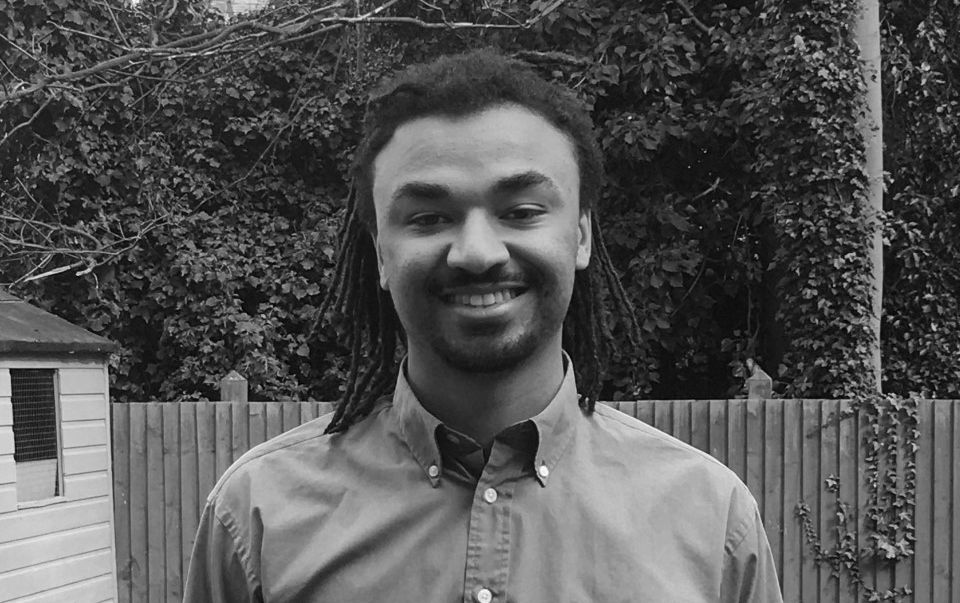Thomas窶冱 story
Thomas Amoaten graduated from Sussex with an undergraduate degree in Biomedical Science, and now he works as a biomedical support worker for the NHS. Thomas spoke to us about his time at ナンワスカフハモニオ, where he co-authored a paper on the Epstein窶釘arr virus and made long-lasting friendships.

How biomedical science helped Thomas’s career as an advanced biomedical support worker
Thomas Amoaten works as a biomedical support worker in the blood science department of an NHS hospital. His degree introduced him a range of career options in science and healthcare.
What made you choose biomedical science at Sussex?
“After seeing what modules Sussex offered on learning about different diseases and how our body tackles them I knew this was a degree I’d find interesting.
“I came to Sussex for the open day and I was very impressed with the talks on how the teaching was done, and the incorporation of lab sessions to put what we learn in lectures into practice. It also helped that Brighton as a city is very friendly and has loads to do.”
What was your standout memory of your time on the course?
“There are so many to choose from to be honest. I think the standout for me is quite general but would be those made with the people I met. The friendship group I am in, who I met during my time on campus, is one I believe I will be a part of for a very long time.
“The campus lifestyle means everyone is together all the time and you get to meet a range of different people from loads of different backgrounds.”
What were you proudest of?
“I think my proudest moment was completing my literature review in my 3rd year at ナンワスカフハモニオ, which was an independent research project that allowed you to share ideas with other students and a professor in the chosen topic.
“It was a daunting task at first, having never taken on such a big project. But I slowly built up the information I found into a review, layer by layer, with the help of my professor and by discussing different approaches to tackling problems I encountered with my peers. It allowed me to use all the skills I had learnt during my first 2 years as well as challenged me to learn new ones which will definitely be beneficial throughout my career.
“Through this I was able to co-author a paper with my professor on whether EBV is associated with breast cancer in specific geographic locations, which was later published. I am really proud of this, and very thankful to her.”
What experiments/modules were your favourite?
“Advanced haematology and transfusion, even though we weren't able to do transfusion due to the pandemic. The style of teaching was really unique - our lecturer got healthcare professionals in these fields to come and teach some of the the lectures. It gave me an insight into what working in those fields would be like.
“I really enjoyed my advanced virology lectures, specifically those centred around epidemiology, and also medical microbiology.”
What are you doing now?
“Currently I am working as an advanced biomedical support worker in a blood science department of a hospital. Before this I was a medical lab assistant working in a microbiology department. Both these jobs have been really interesting and I have learnt a lot about the clinical aspect of healthcare.
“I think in the near future I am going to do a masters centred around either public health or epidemiology of infectious diseases.”
How did your degree at Sussex help you in your career?
“Sussex's Biomedical Science course is based around research rather than the clinical aspect of the profession. I am currently in a clinical job which would not have been possible without my degree.
“I want to look into more research professions (e.g. public health analyst, policy advisor etc.). This, I believe, would be the best place for me to truly use the analytical skills a Biomedical Science degree at Sussex teaches.
“None of these careers would have been known to me had it not been for doing this degree. It opens so many doors in the world of science and healthcare. In the future I could potentially pursue a career in medicine, but after completing the degree I do not see this now as my only option.”
You might also be interested in:
- book a virtual open day place
- what to do with a biomedical science degree
- careers
- how to apply to Sussex.